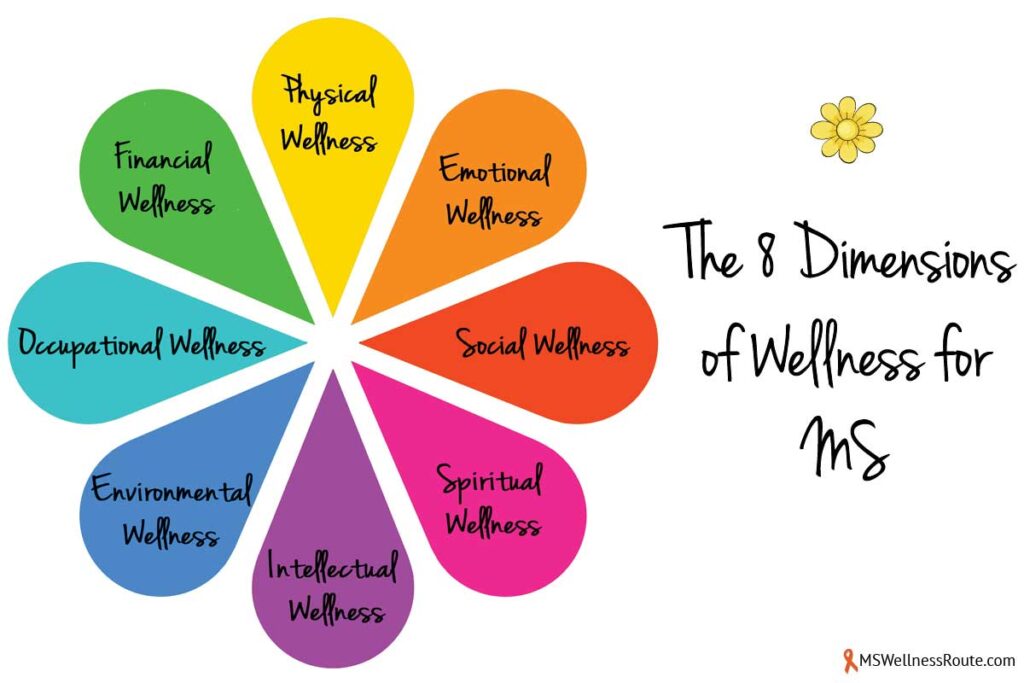Last Updated on January 31, 2025 by Cathy

Have you ever felt like managing MS takes more than just focusing on your physical health? Living with multiple sclerosis (MS) can feel overwhelming. It’s not just about the body—it affects your mind, emotions, and even your spirit. That’s why healing your entire body approach can make such a big difference.
Enter the wellness wheel. It’s a simple way to look at all parts of your life and bring them into balance. Instead of just tackling symptoms, it shifts your focus to other areas of life. These include emotional well-being, relationships, and even your environment.
When you use the wellness wheel, you can feel more in control of your health. It can lower your stress and help you enjoy life more, even with MS.
In this post, we’ll explore how each part of the wellness wheel fits into managing MS naturally. You’ll see how small changes in areas like nutrition, movement, and self-care can make a big impact. Let’s dive in!
What Is a Wellness Wheel?
A wellness wheel is a simple tool. It helps you check in on all the parts of your life that affect your health. Think of it like a bicycle wheel. Each spoke represents a different area of your life. These include nutrition, emotions, and relationships.
When all the spokes are strong and balanced, the wheel spins smoothly. But if one area is weak, the wheel wobbles. That makes the ride harder and less enjoyable.
For people with MS, balance is even more important. When one area of life is out of sync—like too much stress or not eating well—it can lead to flares or make symptoms worse. Small issues in one area can quickly spread to others, creating a chain reaction.
Chronic stress was a major setback in my healing journey. My symptoms were improving, and I was starting to feel like myself again—until a wave of stress hit. That’s when everything changed, and the progress I’d made came to a stop. I learned the hard way that stress and MS feed off each other. Stress can trigger flares, and flares can lead to even more stress.
Breaking that cycle wasn’t easy. It took time, patience, and a lot of effort to change how I respond to life’s challenges. Learning to manage stress has been a game-changer for me. It’s one of the most important steps I’ve taken toward feeling better. This shows how important it is to find balance in every area of life. Emotional health, in particular, plays a key role in managing MS naturally.
That’s why I’ve customized the wellness wheel just to manage MS naturally. It focuses on the areas that matter most for healing. These include reducing inflammation, lowering stress, and improving your quality of life. You’ll see how each part works together to support your health.
Let’s take a closer look at how this powerful tool can guide you toward feeling more in control. It’s time to strengthen every spoke on your wheel!
The 8 Dimensions of Wellness for MS

Managing MS naturally means looking at every part of your life, not just your symptoms. The wellness wheel divides life into eight areas that work together. When you focus on each area, even small changes can add up to big improvements. Let’s explore how these eight dimensions can support your MS journey. You’ll also learn simple steps to create more balance in your life.
1. Physical Wellness
Physical wellness is about taking care of your body so it can heal and feel its best. This means making choices that help your body heal. Focus on foods and activities that reduce inflammation and support your nervous system.
- Why it matters: Eating whole, unprocessed foods is important for your health. They can reduce inflammation and provide the nutrients your body needs. Gentle exercise keeps your muscles active and can help with fatigue. Rest allows your body to recharge.
- Simple tips: Focus on eating more fruits, vegetables, and healthy fats. Try gentle activities like stretching or a short walk, and listen to your body—rest when you feel tired.
2. Emotional Wellness
This section can be tough because living with MS takes a toll on your emotions. It’s natural to feel overwhelmed and even blame yourself at times. Emotional wellness means managing stress and staying positive. This can be challenging, especially when you’re dealing with neurological symptoms. Progress in this area can take time, and that’s okay. Don’t be hard on yourself if it feels like a slow journey; it took me a long time too, and every small step counts.
- Why it matters: Stress and MS create a difficult cycle. Stress can trigger symptoms, and those symptoms can lead to even more stress. Breaking that cycle starts with taking care of your emotional health.
- Simple tips: Try writing down three things you’re grateful for each day. You could also journal to help process your thoughts. Small steps like this can make a big difference.
3. Social Wellness
MS can feel isolating at times, but staying connected with others makes a big difference. Having people in your corner helps you feel less alone and more understood. Thanks to the internet, connecting with others has never been easier. For example, last summer, I took a writing course. Not only did I learn a lot, but I also met people who shared the same interests.
- Why it matters: Supportive relationships can help reduce stress. They also give you a sense of belonging. Talking with others who understand your challenges can be a relief.
- Simple tips: Join an online MS group or look for local meetups. Even reaching out to a trusted friend or family member can help.
4. Spiritual Wellness

Image by freepic.diller on Freepik
Spiritual wellness isn’t just about religion. It’s about finding peace and purpose in your life. This could mean connecting with nature, practicing mindfulness, or exploring your beliefs.
- Why it matters: Having a sense of purpose can help lower stress. It also improves your overall outlook on life. It helps you focus on what truly matters.
- Simple tips: Start with 5 minutes of calm time to yourself each day. Spend time outside in nature to feel more connected and at ease. If you can’t get outside, sit by a window and watch the trees, birds, or snow falling.
5. Intellectual Wellness
Keeping your mind active is just as important as caring for your body. Intellectual wellness means finding ways to learn, grow, and stay curious. It’s not only important due to MS, it’s also important as we age.
- Why it matters: MS can affect cognitive function, so exercising your brain helps keep it sharp. Learning new things can also boost your mood and confidence.
- Simple tips: Try a creative hobby like painting or knitting. Try a creative hobby like painting or knitting. Or challenge yourself to learn a new skill, like playing an instrument or cooking a new recipe.
6. Environmental Wellness
Your surroundings affect how you feel. A calming, healthy home environment can help manage stress. It also creates a sense of stability in your life.
- Why it matters: A cluttered or chaotic space can add to your stress. A clean, peaceful environment supports relaxation and healing.
- Simple tips: Start small—declutter one drawer or add a plant to your space. These little changes can help you feel more comfortable at home.
7. Occupational Wellness

Occupational wellness isn’t just about having a job. It’s about finding purpose and fulfillment. These activities can give you a sense of meaning. This could be through work, hobbies, or personal projects.
- Why it matters: Feeling productive and having goals is important. It gives you a sense of accomplishment. This can boost your mood and help you focus on what you enjoy.
- Simple tips: Set a small goal for a project or hobby you love. Even completing one task can make you feel better.
8. Financial Wellness
Managing finances can be challenging, especially with the costs of MS. Financial wellness means feeling in control of your money. It’s also about finding ways to reduce stress related to finances.
- Why it matters: Money worries can lead to added stress, which can affect your health. Taking steps to manage your finances can bring peace of mind.
- Simple tips: Create a simple budget to track your spending. Look for affordable resources, like community programs or cost-saving tips for healthy living.
Focusing on these eight dimensions can help you find balance. It also supports your journey with MS. Start small—choose one area to work on today. Every step you take strengthens your wellness wheel. This brings you closer to a smoother and more fulfilling ride.
How to Use the Wellness Wheel
Creating your own wellness wheel is simple and a great way to see how balanced your life feels. It’s also a helpful guide for figuring out where to focus your energy. Here’s how to make one:
- Start with a circle: Draw a large circle on a piece of paper. Divide it into 8 equal sections, like slicing a pizza. Each section represents a different area of wellness. These include physical, emotional, social, spiritual, intellectual, environmental, occupational, and financial.
- Rate each area: Think about how balanced or satisfied you feel in each section. Use a scale from 1 to 10, with 1 being “needs a lot of attention” and 10 being “feels great.”
- Shade your wheel: Shade in each section based on your rating. For example, if you rated an area a 5, shade halfway up that section. This gives you a visual idea of where you’re thriving and where you might want to improve.
Once your wheel is ready, pick one area to focus on improving each week. Start with small, realistic goals. If you’re focusing on physical wellness, start small. Try adding one extra serving of veggies to your meals each day.
Remember, it’s not about perfection. Some weeks will feel more balanced than others, and that’s okay! Celebrate your progress, no matter how small—it all adds up to a healthier, happier you.
Creating Wellness

Living with MS can feel unpredictable. The wellness wheel offers a way to bring balance, peace, and control into your life. Focusing on all areas of wellness can make a big difference. It helps you take small steps toward feeling better. These steps can also help you manage your symptoms naturally.
Why not start by drawing your wellness wheel today? You might be surprised by what you learn about yourself and where you can grow. Remember, it’s not about being perfect—it’s about finding what works for you.
I’d love to hear how this tool works for you! Share your experience in the comments or explore more tips and ideas on my blog.
To make things even easier, I’ve created a free wellness wheel template for you to download. Use it to get started and take the first step toward a more balanced and fulfilling life. You’ve got this!
Take Control of Your Wellness with This Free Wellness Wheel Worksheet!
Discover how balanced your life truly is with this simple and effective tool. The Wellness Wheel helps you check in on key areas of your well-being and set meaningful goals. Sign up below to get your free printable worksheet and receive weekly wellness tips straight to your inbox!
Want to remember this health tip? Pin it to your Pinterest board!

Image by Amore Seymour from Pixabay
Creating Balance with a Wellness Wheel for MS







